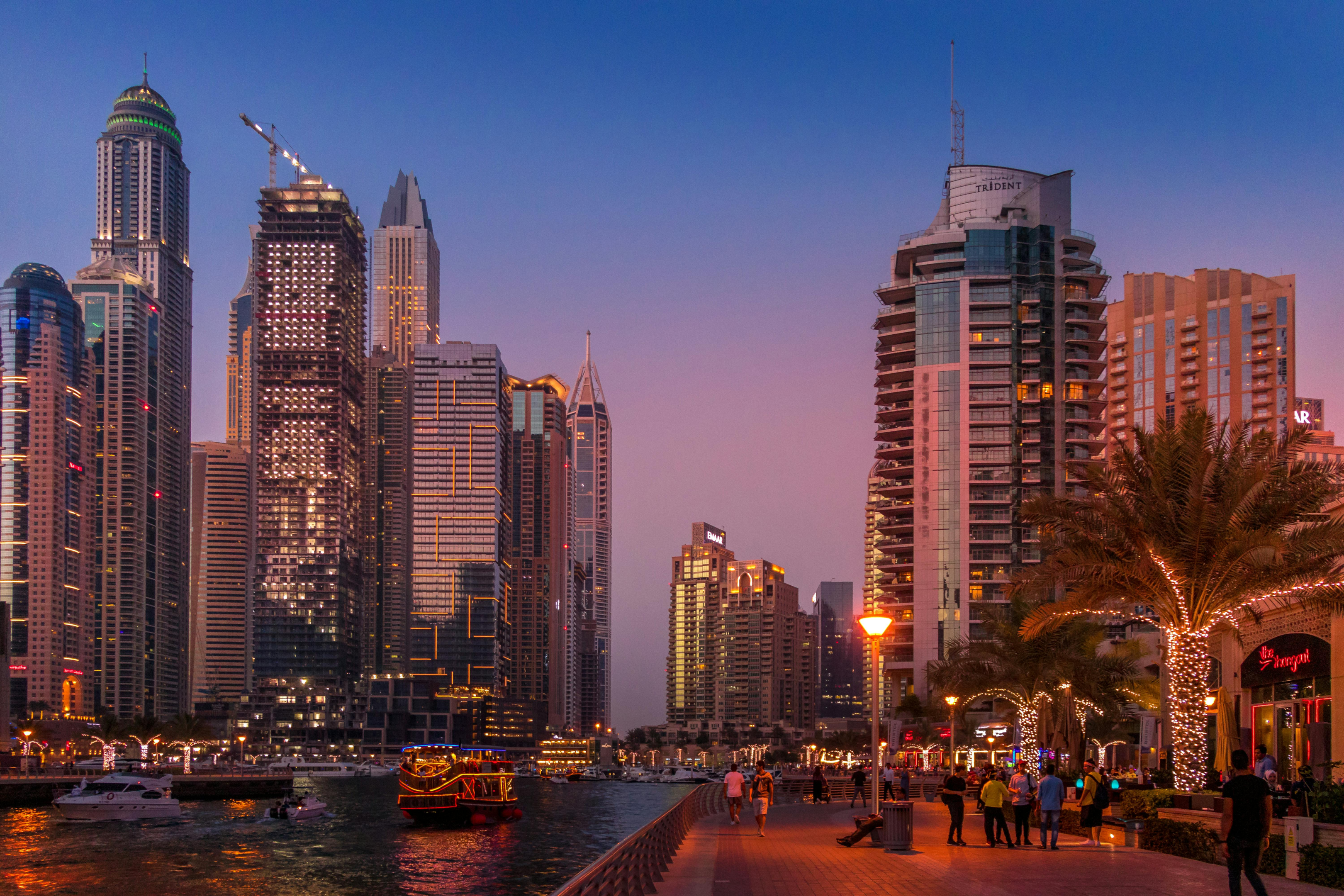
This is apart of our weekly series associated with the The Global Subsidiary Index. The series is designed to help businesses identify the best countries for establishing a subsidiary based on key operational factors. GEOS provides a data-driven ranking of jurisdictions worldwide, assessing across 40+ criteria to bring you insights into global expansion opportunities.
Each country on the index is scored on an overall score out of 100, with each individual criterion out of 5 or 10. Higher scores indicate a more favorable environment for businesses. By leveraging these insights, companies can make informed decisions on where to establish a legal presence.
Set up business in Dubai and tap into one of the region’s strongholds for tech growth. The UAE has spent the last two decades building a strong, diverse economy. And tech is now at the center of that growth.
It’s not slowing down, either. Statista forecasts a $3.8 billion jump in tech service revenue by 2025. That kind of growth creates real opportunities for global companies.
In this guide, we’ll walk through how GEOS makes expansion easier. From choosing the right setup to handling compliance, visas, and office space – GEOS helps you get it done right.
Why Should You Expand to the UAE?
There are a number of reasons to set up business in Dubai or the UAE as a whole. For one, it gives you access to fast-growing markets across the Middle East, Africa, and Asia.
Selecting the right business location is crucial, as businesses must provide a physical address that complies with specific rules set by the relevant authorities. With a GEOS Global Subsidiary Index Score of 71.2, the UAE stands out for its infrastructure, ease of trade, and digital-first approach.
The population is around 10 million, and about 88% are expatriates. That creates a diverse, highly skilled talent pool. The country’s high GDP per capita reflects its strong, stable economy.
Tax policy also works in your favor. Most Freezone income is tax-free. Outside Freezones, only profits over AED 375,000 are taxed at 9% – the lowest rate in the GCC, apart from Bahrain. It’s simple and business-friendly.
Over the last two decades, the UAE has shifted from oil to a more diversified economy. Sectors like tourism, tech, logistics, and finance are growing fast. Major infrastructure projects and mixed-use developments align with national strategies like Vision 2031 and the 2050 Net Zero Strategy.
You’ll see major upgrades across transport and urban development. Expanded airports, rail networks, and smart city projects are reshaping how people live and work. Dubai is also rising as a global tech hub, backed by heavy investment in innovation.
The UAE isn’t ignoring its challenges. Water scarcity is a serious issue, but the country is investing in large-scale desalination and wastewater treatment. The Taweelah plant, soon to be the world’s largest, shows its commitment to long-term sustainability.
On the energy side, the UAE is pushing ahead with renewables. The Mohammed bin Rashid Al Maktoum Solar Park aims to deliver 5,000 MW by 2030. These projects support the shift to low-carbon energy and reduce reliance on fossil fuels.
The corporate tax system, introduced in 2023, keeps compliance light. It’s designed around international best practices while staying competitive. That helps businesses scale without getting buried in red tape.
The UAE offers a rare mix: strong policy, global access, top talent, and a clear vision for the future. If you’re looking to expand, it’s one of the best places to grow.

Competitive Tax & Business Incentives
Few places make it easier to do business from a tax perspective than the UAE. There’s no personal income tax, no withholding tax, and no capital gains tax.
Foreign ownership is straightforward. The UAE scores 8/10 for openness and allows 100% foreign ownership across mainland, free zone, and offshore structures. That means no need for local sponsors and fewer restrictions on setup. Furthermore, there is no minimum capital requirement for mainland companies, allowing greater flexibility in registration and operation within the emirate.
Hiring is cost-effective too. The UAE scores 5/5 on employer payroll costs. Social security contributions apply only to UAE and GCC nationals. Employers pay 12.5% for UAE nationals – or 15% in Abu Dhabi – but pay nothing for expatriates. With expats making up most of the workforce, this keeps overall hiring costs low.
If you’re looking to set up business in Dubai, DIFC in particular, the company formation process includes a new monthly savings scheme replacing the end-of-service gratuity system. Employers contribute 5.83% to 8.33% of base salary depending on how long the employee has been with the company. It’s simple, consistent, and easier to manage.
Altogether, the UAE gives businesses a rare combination—low taxes, full ownership rights, and lean hiring costs. Economy insurance activities further bolster this environment by providing additional support to entrepreneurs. It’s a strong base for growing fast without extra complexity.
Skilled Workforce & Favorable Hiring Regulations
The UAE keeps drawing in top talent from across the globe. Conducting market research is essential for understanding the local market dynamics and hiring the right talent. Talent runs deep in the hospitality, finance, sales, and tech sectors. Here’s how key roles score for talent availability:
- Sales: 5 out of 5
- Finance: 5 out of 5
- Marketing: 4 out of 5
- Engineering: 2 out of 5
Sales and finance lead the way. Marketing is strong but slightly less competitive. Engineering talent remains harder to find.
Employment laws in the UAE are fairly straightforward. The legal framework is clear, but some added steps—like employer sponsorship and visa-linked employment—make the process more complex. On a complexity scale, UAE employment law scores 8 out of 10. It’s manageable, but employers need to stay on top of the rules.
There’s little to no union activity. The UAE doesn’t officially allow trade unions, and labor strikes are rare. That keeps labor relations simpler for employers and gives it a full 5 out of 5 for low union complexity.
Visa reforms have made hiring even easier. The Ministry of Human Resources and Emiratisation offers 12 types of work permits. These range from hiring international candidates and part-time workers to student trainees and freelancers. There are also options for hiring golden visa holders and UAE or GCC nationals. This system gives companies a lot of flexibility in how they build their teams.
The UAE didn’t just become a talent hub by chance. The country made deliberate changes to attract and retain top professionals. While the UAE ranks around the middle globally in economic complexity—54th in trade and 50th in technology—it continues to stand out for its ease of hiring and access to international talent.
The first platform dedicated to streamlining entity setup and management.
How to Set Up a Business in the UAE
Setting up a business in the UAE starts with choosing between a legal structure such as free zone or a mainland setup. The economic department plays a crucial role in approving and registering business titles, ensuring compliance with local naming conventions. Local government entities also facilitate the establishment of businesses through services like the Bashr service and instant licensing, providing a streamlined process for investors. Both options are straightforward and offer real advantages, depending on your goals.
Free zones work well for businesses that don’t need to sell directly in the UAE. Some key benefits include:
- 100% foreign ownership
- No corporate or income tax
- Full repatriation of capital and profits
- Fast setup and independent regulations
- Access to modern infrastructure and global markets
Free zone entities can be registered with a single shareholder and director, and the shareholder and director can be a foreigner and not a resident of the UAE. This type of setup is known as a free zone establishment, which highlights the unique legal framework and ownership potential within free zones.
The UAE has over 40 free zones, each serving different industries like finance, healthcare, and logistics. The free zone authority is responsible for the initial approval process, signifying the government’s willingness to allow business setups within these zones. They’re designed to save time and simplify operations.
Mainland companies are better for businesses that want to operate within the UAE and reach local customers. Key points:
- Full access to the UAE economy and B2C trade
- Most activities now allow 100% foreign ownership
- Some licenses still require an Emirati partner or service agent. Obtaining business licences is essential, and they must be paid for within a specified timeframe to avoid application forfeiture.
- Ability to bid on government contracts
Mainland companies must meet regulatory requirements, including having a physical office and potentially needing a local sponsor. Local municipalities play a crucial role in ensuring compliance with land planning regulations and other local requirements. They offer operational benefits and trade capabilities compared to free zone companies.
One cultural point to keep in mind—relationships matter. The concept of wasta, or influence through personal connections, still plays a role in business development and hiring. Who you know can help you move faster.
If your focus is global, a free zone may be the better choice. If you’re looking to grow inside the UAE, the mainland setup gives you more reach. Both options are structured to support new businesses.
Choosing the Right Business Structure
Choosing the right legal status and business structure, such as a limited liability company, is crucial for any entrepreneur looking to set up a business in the UAE. The UAE offers various business structures, including mainland companies, free zone companies, and offshore companies. Each business structure has its unique requirements and benefits.
Mainland companies are onshore entities that operate within the UAE and internationally. A mainland company refers to an onshore entity in the UAE that is registered with the Department of Economic Development. They are registered with the relevant Emirate’s Department of Economic Development and have no restrictions on commercial activities. However, they may require a local sponsor or UAE national partner for specific business activities.
Free zone companies, on the other hand, offer 100% foreign ownership and are an alternative to onshore setups. They operate under their own regulatory authority and issue licenses and govern business activities. Free zone entities can be registered with a single shareholder and director, and the shareholder and director can be a foreigner and not a resident of the UAE.
Offshore companies are not intended to conduct business within the UAE and are often used as holding companies. A private joint stock company (PrJSC) allows for privately negotiated transactions among a limited number of shareholders, which can streamline ownership and management. They do not engage in commercial activities and cannot obtain a tax residency certificate.
A public joint stock company (PJSC) requires a minimum of five shareholders and is suitable for larger firms, particularly those planning to list on a stock exchange. However, they can open a UAE bank account and are typically used for international trading, consulting, or owning assets.
When choosing a business structure, entrepreneurs should consider factors such as ownership requirements, operational flexibility, and tax implications. It is essential to consult with a business setup expert to determine the most suitable business structure for your specific needs.
Limited Liability Company (LLC)
A Limited Liability Company (LLC) is a popular business structure in the UAE, offering a range of benefits for entrepreneurs and investors. An LLC is a private company with a minimum of two and a maximum of 50 shareholders. The liability of the shareholders is limited to their share capital, providing a level of protection for their personal assets.
To establish an LLC in the UAE, investors must obtain a trade license from the Department of Economic Development and register the company with the relevant authorities. The company must also have a physical address in the UAE and meet the requirements of the relevant free zone authority. This ensures that the business complies with local regulations and can operate smoothly within the UAE’s legal framework.
The process of setting up an LLC involves several steps, including choosing a trade name, preparing the Memorandum of Association, and obtaining initial approval from the Department of Economic Development. Once these steps are completed, the company can proceed with the registration process, which includes submitting the necessary documents and paying the required fees.
An LLC offers flexibility in terms of business activities and ownership structure, making it a suitable option for a wide range of industries. Whether you are looking to start a new venture or expand an existing business, an LLC provides a solid foundation for growth and success in the UAE.
Foreign Company Branches
Foreign company branches are a type of business entity that allows foreign companies to establish a presence in the UAE. These branches are registered with the Department of Economic Development and are subject to the same regulations as mainland companies. Foreign company branches can engage in a wide range of business activities, including trading, manufacturing, and services.
To establish a foreign company branch, investors must submit an application to the Department of Economic Development and provide documentation, such as a business plan, passport copies, and proof of address. The application process typically involves obtaining initial approval from the UAE government and registering the branch with the relevant authorities.
Incorporation & Compliance Essentials
Bringing in foreign talent to the UAE is fairly straightforward, but it’s not without its rules. Every employee needs an employer-sponsored visa. That part isn’t optional. The UAE scores 5 out of 5 for immigration complexity—not because it’s confusing, but because sponsorship is mandatory.
Only UAE-based law firms, courts, and notary public have the authority to prepare and attest documents like the Memorandum of Association or Local Service Agent Agreement. The digital government regulatory authority plays a crucial role in overseeing these business activities and facilitating the necessary digital infrastructure.
The local Department of Economic Development registers trade names, ensuring they adhere to strict naming conventions and differentiating them from trademark registrations.
Companies also need a physical office to apply for visas. More space allows for more employees. This gives the UAE a 3 out of 5 for registered address requirements. It works well for most businesses but limits remote-only setups.
Selecting an appropriate legal structure is crucial and should align with the specific activities of the business. Government approvals for sectors like engineering affairs telecommunications are overseen by specific ministries, such as the Telecommunications and Digital Government Regulatory Authority.
There are three main types of work visas:
- Standard work visa: For employees in private companies, free zones, or government roles. The employer handles the process.
- Green visa: A five-year self-sponsored visa for freelancers and skilled professionals.
- Golden visa: For top performers, investors, and high earners who want long-term residency.
To qualify for a Green visa, freelancers need a permit, a degree or diploma, and proof of AED 360,000 income over the past two years. Skilled employees need a contract, a relevant degree, and a salary of at least AED 15,000 per month. The visa renews after five years.
The system runs smoothly if you follow the steps. Get your paperwork right, secure a business address, and choose the right visa. It’s structured, not difficult. Compliance with justice legal activities regulated by the Ministry of Justice is also essential for legal consultancy services.
Local Service Agent Agreement
A local service agent agreement is a contract between a foreign company and a UAE national or company that provides services such as sponsorship, licensing, and regulatory compliance. This agreement is required for foreign companies that wish to establish a presence in the UAE, including free zone companies and foreign company branches.
The local service agent agreement must be signed by the foreign company and the UAE national or company, and must be attested by a UAE-based law firm. The agreement must also be registered with the relevant authorities, including the Department of Economic Development.
Cost of Living & Office Space
Setting up a company in the UAE comes at a cost, but it opens the door to real growth. Dubai and Abu Dhabi have higher living and office expenses, but they also offer unmatched access, infrastructure, and global reach.
- DMCC in Dubai is home to over 25,000 companies and offers flexible office setups with residential and retail space nearby.
- Abu Dhabi backs startups through Hub71, offering funding, housing, office space, and direct access to regulators like ADGM.
For those ready to set up business in Dubai, the UAE offers both regional access and room to scale. Abu Dhabi also gives companies a path into the wider GCC market. With strong tech adoption, government support, and a growing talent pool, many startups and global firms see long-term value in setting up here.

Regulatory & Compliance Risks with the Department of Economic Development
The UAE makes it easy to start and run a business, especially in free zones. It scores 10 out of 10 for ease of doing business. But compliance is getting tougher. With stricter rules around VAT, ESR, and corporate tax, the country now scores 3 out of 5 for reporting.
Businesses must also navigate additional government approvals for various activities, depending on the sector and corresponding government authority. Obtaining approvals from other government entities for specific business activities, such as transport, legal activities, tourism, and telecommunications, is also necessary to ensure compliance.
Regulators aren’t holding back. In 2024, the DFSA and FSRA.) issued fines for:
- Weak anti-money laundering measures
- Misleading investors and poor compliance planning
Firms are under more pressure to stay transparent and follow clear codes of conduct. Ensuring compliance with land planning regulations is also crucial for operational legitimacy. Government entities governing specific business activities, such as the Ministry of Interior and the Ministry of Justice, require firms to adhere to stringent regulations.
Additional approvals may be required depending on the particular business, especially in areas such as legal and security affairs. Acting with integrity and protecting client interests is no longer just good practice – it’s expected.
Enforcement is only going to increase. Companies that stay ahead of the rules will be in a better position to grow and build long-term trust.
Visa Requirements
Obtaining a visa is a crucial step in starting a business in the UAE. The UAE offers various types of visas, including investor visas, employment visas, and residence visas. The type of visa required depends on the business structure and the individual’s role in the company. Local government entities play a significant role in facilitating the visa process, ensuring a streamlined and efficient experience for investors.
Investor visas are required for foreign investors who want to set up a business in the UAE. These visas are typically issued for a period of 2-3 years and can be renewed. Additionally, the foreign company branches ministry oversees regulations for foreign company branches, indicating the importance of government compliance for operating in specific sectors.
To obtain an investor visa, the individual must meet certain requirements, such as having a minimum capital investment in the company and meeting the necessary health and insurance requirements.
Employment visas are required for employees who want to work in the UAE. These visas are typically issued for a period of 2-3 years and can be renewed. To obtain an employment visa, the individual must meet certain requirements, such as having a job offer from a UAE-based company and meeting the necessary health and insurance requirements.
Residence visas are required for individuals who want to live in the UAE. These visas are typically issued for a period of 2-3 years and can be renewed. To obtain a residence visa, the individual must meet certain requirements, such as having a minimum income and meeting the necessary health and insurance requirements.
It is essential to note that visa requirements can vary depending on the emirate and the type of business. It is recommended to consult with a business setup expert to determine the specific visa requirements for your business.
Talent Availability & Scaling Considerations for Free Zone Companies
The UAE offers solid ground for building and scaling a business. It has a diverse economy with strong industries like real estate, logistics, finance, hospitality, and professional services. That gives it an industry diversity score of 4 out of 5. Companies in these sectors can scale faster thanks to a well-established ecosystem.
Establishing a representative office can be an effective way for foreign companies to support marketing and promotional activities while gathering market insights. UAE free zone companies offer unique benefits such as 100% foreign ownership and operational flexibility within free zones.
Additionally, foreign company branches in the UAE must consider specific regulations and may require additional government approvals depending on their business activities.
Talent is widely available in many areas, especially sales, finance, and tech. English is the main business language, which keeps communication smooth across global teams. The UAE scores 3 out of 5 for language, as Arabic is still important in government and B2G roles.
For businesses planning to work closely with local authorities or expand into public-sector contracts, having Arabic speakers on the team can be a real advantage. Additionally, a local service agent agreement is crucial for businesses, particularly those with professional licenses or branches of foreign companies, to act as an administrative liaison with the government.
Hiring and scaling are both realistic here, especially for firms that need a mix of local and international talent. With the right structure, companies can grow quickly and tap into regional markets. Recent changes in ownership regulations now allow foreign investors to fully own a UAE company without the need for local shareholders.

How GEOS Simplifies Your Expansion into the UAE
Setting up in the UAE takes more than paperwork. You need local insight, speed, and the right support. If you’re ready to set up business in Dubai, GEOS helps you get it right from day one.
End-to-End Entity Setup & Compliance Management
GEOS gives you a clear path forward. You skip the common delays. They also help you understand the implications of choosing the right legal entity for your business, ensuring compliance with UAE regulations.
AI-Powered Global Expansion Support
With Geovanna, you’re never guessing your next move. She helps you navigate key steps like visa-linked employment, ESR reporting, and Freezone renewals. Geovanna keeps you informed and on track, so you can move forward with confidence.
Is the UAE the Right Fit for Your Business?
With a GEOS Global Subsidiary Index Score of 71.2, the UAE offers the right mix of opportunity and stability. You get low tax exposure, a strong launchpad into the GCC, and access to world-class infrastructure. If you’re ready to grow, GEOS helps you land strong and scale fast.
📩 Contact GEOS to build your UAE expansion plan, built around your business goals.
This article does not constitute legal advice.




